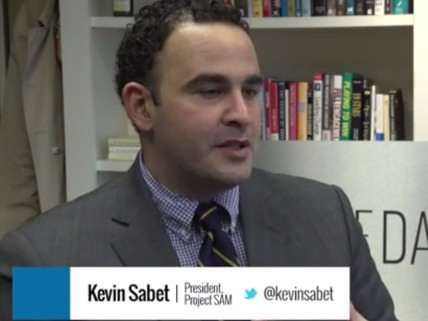Anti-Pot Activist on Support for Legalization: 'What Goes Up Must Come Down'
Kevin Sabet implausibly takes solace from a drop in public approval between 1977 and 1985.

In an interview with Vox's German Lopez, anti-pot activist Kevin Sabet takes solace, rather implausibly, from the dip in public support for marijuana legalization in the late 1970s and early '80s:
Inevitability is the number-one talking point of the legalization movement….That's a really powerful talking point for them, because if people think something is inevitable, even if they're against it, they're likely to surrender [to] it because it's not worth their time to deal with it or fight.
There's no doubt that there's some truth to the momentum for legalization that has grown in the past 10 years or so. But I think what goes up must also come down. I think these things come in cycles. In the 1970s, we had the exact same thing happen with support for legalization. Maybe not as much as we have now, but we did see a dramatic change from the 1950s to the 1970s—in the same way you've seen a change from the 1990s to the 2010s. And that reversed for all sorts of reasons after the 1970s. It might reverse this time, but it might not.
Although I am not generally inclined toward optimism about drug policy, it seems to me that Sabet is grasping at straws. The current level of support for legalization is historically unprecedented—much higher than it was even before the decrease to which Sabet refers. Gallup's numbers show support for marijuana rising from 12 percent in 1969 to 28 percent in 1977, then falling to 23 percent by 1985, after which it resumed its upward climb, reaching 58 percent in 2013 before dropping to 51 percent last year.
Are we already experiencing the reversal for which Sabet is hoping? Probably not. Gallup's 2013 number was unusually and surprisingly high. The 2014 number is closer to the results of other surveys, which generally do not show a drop in support between 2013 and 2014. In the General Social Survey (which is conducted every two years), support for legalization rose from 43 percent in 2012 to 52 percent in 2014. Similarly, the Pew Research Center put support for legalization at 52 percent last October, up from 45 percent in 2011. The CBS News poll shows support rising from 45 percent in April 2013 to 51 percent the following January and February, then falling to 48 percent in May.
Gallup's latest numbers indicate that support for legalization is much stronger now than it ever was in the 1970s—86 percent higher than the 1977 peak. Even if the number dropped as it did after then (by 18 percent between 1977 and 1985), support would still be 54 percent higher than in 1977. And it seems much more likely that the number will continue to rise, given the generational differences on this issue. Last year Pew put support for legalization at 63 percent among respondents born between 1981 and 1996.
Somewhat counterintuitively, self-reported current marijuana use was higher in the late 1970s, when support for legalization was much lower. In the National Household Survey on Drug Abuse (NHSDA), for instance, 20 percent of 26-to-34-year-olds reported using marijuana in the previous month, compared to 13 percent of that same age group in the 2013 National Survey on Drug Use and Health (NSDUH). Because of changes in methodology, the two surveys are not directly comparable, but the differences tend to boost the NSDUH numbers, meaning the true gap between 1979 and 2013 is probably even bigger. Similarly, the share of high school seniors reporting past-month use of marijuana in the Monitoring the Future Study (which began in 1975) peaked at 37 percent in 1978, compared to 24 percent last year. Increases in marijuana use by teenagers, in fact, had a lot to do with the anti-pot backlash that began around this time.
Although current marijuana use is less common today, the percentage of Americans who have tried marijuana is much larger. Less than a quarter of Americans 26 or older reported ever using marijuana in the 1977 NHSDA, compared to nearly half in the 2013 NSDUH. Even allowing for greater candor in the NSDUH (which the methodological changes were designed to promote), that is a big difference. Widespread direct and indirect experience with marijuana probably is the most important factor driving the increase in support for legalization.


Show Comments (14)